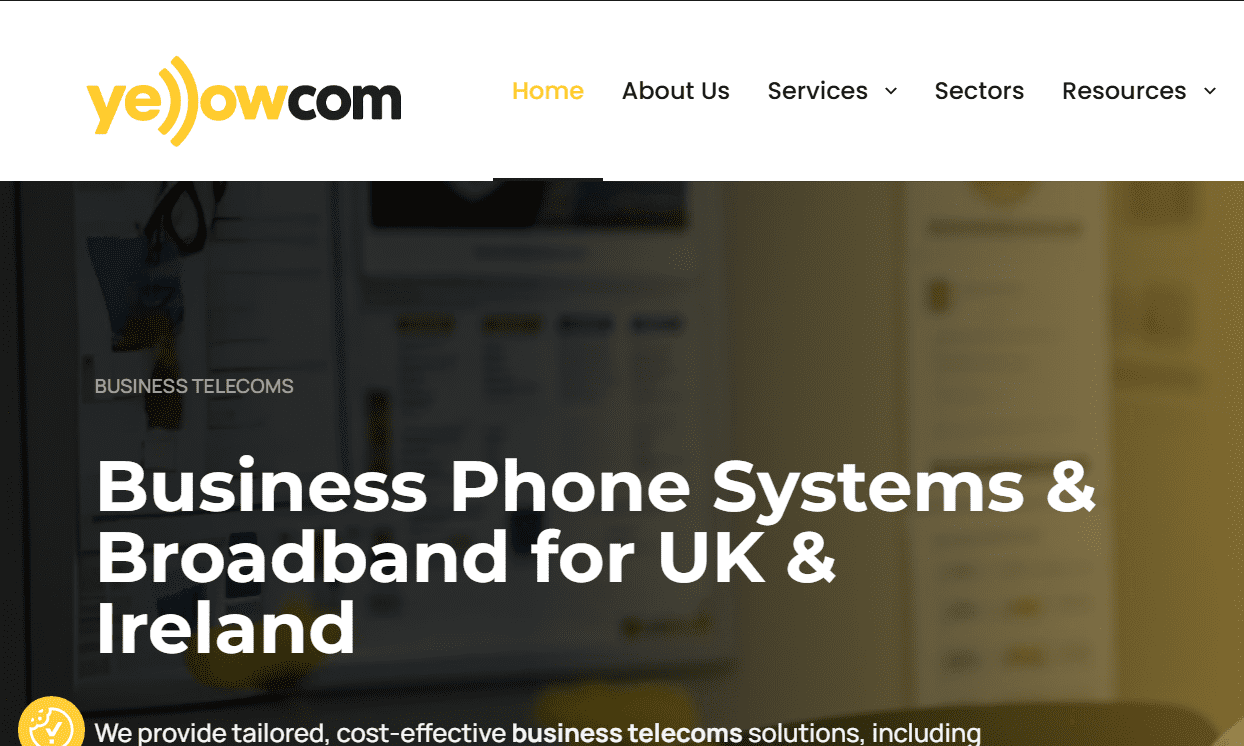The Brexit transition period revealed a stark truth about business preparedness: companies with modern communication infrastructure adapted and thrived, while those relying on traditional systems struggled or failed. As trade rules shifted, regulatory frameworks diverged, and supply chains fractured, the ability to communicate seamlessly across newly complicated borders became the difference between growth and closure. Yellowcom, serving businesses across Scotland, Northern Ireland, and Ireland from offices in Glasgow, Belfast, and Dublin, witnessed first-hand how communication capabilities determined which companies navigated Brexit successfully and which became its casualties.
The data tells a sobering story. UK government statistics show that exports to the EU fell by £20 billion in 2021, with SMEs disproportionately affected. Yet within these grim figures lies a more nuanced narrative: businesses with sophisticated business phone systems and integrated cloud phone systems maintained or even grew their European trade, while those dependent on traditional infrastructure saw relationships crumble. The technology gap became a survival gap, particularly acute for companies operating across the UK-Ireland border where Brexit’s impact proved most complex.
The Great Communication Test
Brexit created an overnight transformation in how UK and EU businesses could interact. What were once simple internal communications between offices became international calls. Routine data transfers suddenly required compliance checks. Customer service that once operated seamlessly across borders faced new regulatory requirements. For businesses unprepared for these changes, the results proved catastrophic.
A Scottish seafood exporter’s experience exemplifies the challenge. Pre-Brexit, coordinating with French buyers involved simple phone calls and email exchanges. Post-Brexit, they needed real-time communication across customs agents, logistics providers, veterinary inspectors, and customers—all while seafood sat deteriorating. Companies with integrated communication platforms managed this complexity; those juggling multiple phone lines and disconnected systems watched shipments spoil and relationships dissolve.
Northern Ireland faced unique challenges as the only UK region sharing a land border with the EU. Businesses suddenly needed to navigate dual regulatory regimes, managing UK mainland relationships while maintaining EU single market access. Companies in Belfast reported needing separate communication channels for GB and EU operations, different compliance recording systems, and the ability to instantly pivot between regulatory frameworks. Those with flexible, cloud-based systems adapted; others drowned in complexity.
The financial services sector discovered that passporting rights loss meant more than regulatory change—it required complete communication infrastructure overhaul. Edinburgh fund managers could no longer simply call Frankfurt colleagues. Every interaction required compliance recording, data residency verification, and audit trails. Firms with modern systems implementing these requirements automatically continued operating. Those attempting manual compliance saw costs spiral and errors multiply.
Technology Winners and Losers
Analysis of post-Brexit business performance reveals clear patterns linking communication capabilities to outcomes. Companies that had invested in modern, flexible communication infrastructure before Brexit enjoyed distinct advantages that compounded over time.
The winners shared common characteristics. They operated cloud-based phone systems allowing instant reconfiguration as requirements changed. Their platforms integrated with compliance and logistics systems, automating previously manual processes. They could instantly provision local numbers in EU markets, maintaining presence despite physical absence. Most critically, they could scale communication capacity up or down as trade volumes fluctuated during uncertainty.
Dublin became an unexpected beneficiary as UK companies established EU subsidiaries. However, simply opening an Irish office didn’t guarantee success. Companies needed communication systems that could seamlessly connect Dublin operations with UK headquarters while maintaining regulatory separation. Those using unified platforms succeeded; those attempting to bridge separate systems struggled with coordination failures.
The losers typically relied on traditional PBX systems, fixed-line telephony, and basic broadband connections. When Brexit demanded instant adaptation, these companies faced weeks-long waits for new lines, expensive international calling charges, and inability to integrate with new software systems. Many Scottish manufacturers reported losing EU customers simply because they couldn’t establish local contact numbers quickly enough.
Technology sector analysis proved particularly revealing. Software companies with cloud-based communications pivoted effortlessly, establishing virtual presence across EU markets within days. Meanwhile, traditional businesses with premise-based systems watched helplessly as competitors captured their European customers. The disparity wasn’t about company size or sector—it was purely about communication infrastructure modernity.
Northern Ireland’s Unique Position
Northern Ireland’s experience deserves special attention as the region most affected by Brexit’s communication challenges. The Northern Ireland Protocol created a unique situation where businesses needed to operate simultaneously within UK and EU frameworks, making sophisticated communication systems not just advantageous but essential.
Belfast’s financial services sector exemplifies the challenge. Firms serving both British and Irish markets needed communication systems that could maintain regulatory compliance for both jurisdictions simultaneously. This meant separate recording systems, different data retention policies, and the ability to route calls through appropriate jurisdictions. Companies with flexible, programmable communication platforms managed this complexity; others relocated operations entirely.
The peace process dimension added another layer. Cross-border business relationships built over decades of peace depended on seamless communication. When Brexit threatened these connections, companies with modern systems maintained relationships by ensuring communication remained frictionless despite new administrative burdens. Those without such capabilities saw carefully cultivated partnerships dissolve.
Manufacturing companies in Northern Ireland faced particular pressure. Integrated supply chains spanning Derry to Donegal suddenly required complex documentation and communication protocols. Businesses with systems that could automatically generate customs notifications, coordinate with inspection agencies, and maintain audit trails continued operating. Those attempting manual coordination faced delays that destroyed just-in-time manufacturing models.
Scotland’s Independence Implications
Scotland’s Brexit experience carries additional significance given ongoing independence discussions. Scottish businesses learned valuable lessons about the importance of communication infrastructure during constitutional change—lessons that would prove crucial in any future independence scenario.
Edinburgh’s financial sector demonstrated how communication capabilities determine whether businesses stay or relocate during uncertainty. Firms with flexible, cloud-based systems could serve clients from anywhere, making physical location less critical. Those tied to traditional infrastructure faced stark choices about where to base operations. This flexibility—or lack thereof—would become even more critical during potential independence transitions.
The fishing industry’s Brexit struggles highlighted communication’s role in international trade. Aberdeen companies that quickly established EU communication channels maintained export markets. Those relying on traditional systems lost decades-old relationships. Any future Scottish independence would require similar rapid establishment of international presence—possible only with modern communication infrastructure.
Technology companies showed how sophisticated communications enable political neutrality. Glasgow software firms with cloud-based systems served English and European clients equally, regardless of political changes. This ability to transcend borders through technology would prove essential for Scottish businesses navigating potential independence.
Ireland’s Unexpected Advantage
Ireland emerged as Brexit’s unexpected winner, partly due to superior communication infrastructure investments made over previous decades. The combination of EU membership, English language, and modern digital infrastructure attracted UK businesses seeking European bases.
Dublin’s docklands became a magnet for financial services relocations, but success varied dramatically based on communication capabilities. Firms that could instantly integrate Dublin operations with London offices thrived. Those attempting to operate Dublin as a separate entity struggled with coordination and culture clashes. The difference typically came down to unified communication platforms versus disconnected systems.
Cork’s pharmaceutical sector benefited from UK companies seeking EU distribution hubs. However, managing complex supply chains across UK-EU borders required sophisticated communication systems integrating with regulatory reporting, logistics tracking, and quality systems. Companies with modern infrastructure captured this business; others couldn’t meet requirements.
Rural Ireland saw unexpected benefits as remote working became standard. Improved broadband through the National Broadband Plan, combined with cloud-based business communications, enabled rural areas to attract businesses that previously would have chosen Dublin. This geographic dispersion of opportunity wouldn’t have been possible without modern communication infrastructure.
Lessons for Future Disruptions
Brexit taught harsh lessons about business resilience that extend beyond EU relations. The companies that survived and thrived shared one characteristic: communication infrastructure that could adapt instantly to changing requirements.
The pandemic arrived just as Brexit transition ended, delivering a second shock that further separated digitally capable businesses from traditional operators. Companies that had modernised communications for Brexit found themselves perfectly positioned for remote working. Those that hadn’t faced double jeopardy—unable to serve EU markets or support remote workers.
Climate change presents the next challenge. As extreme weather increases and carbon reduction becomes mandatory, businesses will need communication systems enabling remote collaboration, reducing travel, and maintaining operations despite physical disruptions. Brexit survivors who invested in modern infrastructure are already prepared; others face another existential challenge.
Future trade deals will require similar adaptability. Whether UK agreements with Asia-Pacific nations or Ireland’s continued EU evolution, businesses need communication systems that can instantly accommodate new requirements. The lessons are clear: flexible, cloud-based infrastructure isn’t optional—it’s essential for survival.
Conclusion
Brexit’s aftermath reveals an uncomfortable truth: many business failures attributed to trade barriers actually resulted from technological inadequacy. Companies with modern communication infrastructure found ways to maintain EU relationships, manage regulatory complexity, and even identify new opportunities. Those with traditional systems became Brexit casualties not because of politics but because of technology.
The geographic patterns—Ireland’s success, Northern Ireland’s struggles, Scotland’s divisions—often reflected communication infrastructure quality more than political positions. Businesses with cloud-based, flexible systems transcended borders and regulations. Those tied to traditional infrastructure found themselves trapped by limitations that Brexit merely exposed.
For businesses across Scotland, Northern Ireland, and Ireland, the message is clear: political and economic disruption is inevitable, but technological preparedness determines survival. Investment in modern communication infrastructure isn’t about efficiency or cost savings—it’s about existential resilience in an uncertain world.
The next disruption—whether Scottish independence, Irish reunification, or unforeseen global crisis—will similarly divide businesses into survivors and casualties. The dividing line won’t be size, sector, or location, but rather the simple question: does your communication infrastructure enable instant adaptation, or does it constrain your options? Brexit already answered this question for thousands of businesses. The survivors are those who listened.



































